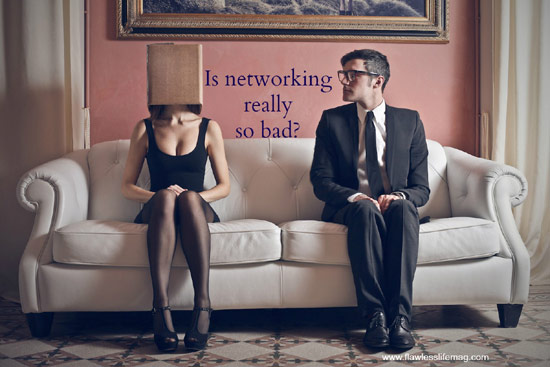Soon after people graduate from college, seasoned professionals almost universally advise these young adults to "network." And by this they mean: get to know lots of people in various different industries and walks of life. By doing so, the advisors opine, graduates build their list of contacts, the number of rich people they can approach for better-paying and more fancy jobs involving more golf games on Fridays afternoons where they cut big business deals.
Armed with a more expansive network, they can call another member of their network asking to mooch hot and scarce tickets to big sporting events, rock concerts, and power broker networking events. And they get what they ask for. They go to Super Bowls and Final Fours. While there, they network with more people. It's exponential people collecting.
When I got out of college, the professionals unloaded all this networking advice on me.

Thirty years after that deluge, I conclude that networking is overrated, intractable, and something to be avoided. No one would accuse me of being good at networking, so I'm biased.
People who network don't think of me first when they want to network. Connecting with me—having access to my contacts and assets and network—offers a low return on their investment. I write articles that nobody reads, and share ideas that no one understands, and type all the time wondering why my network is fractured.
My go-to strategy for networking-which is ineffective and curious-is to email my boyhood and college school friends with unsolicited anecdotes about my life.My best friend since second grade told me recently: "Chuck, nobody reads your articles."
He's been hurting me since second grade saying mean things such as this. Now I write means things about him. The network between the two of us has never existed. We don't help each other. We tear each other down. We don't like each other. It's a mess.
When someone needs to have a name of someone who works for J.P. Morgan in the executive suite, I'm not the guy they call. They are smart not to do so because they would be wasting time. In general I'm a big proponent of wasting time, but other people tend not to agree.
I don't know any J.P. Morgan executives. It's plausible I have once or twice stood next to one while watching my kid's baseball game because I send him to a ritzy high school where everything is about networks and being wealthy. The J.P. Morgan guy no doubt sends his kid there too and maybe his son plays on the team also and probably isn't as talented as mine.
But he's not in my network and I am not in his. On the same treadmill we do not roll. Instead of talking with him and feeling inferior because he's wealthy and powerful, I prefer watching the game and hoping his son strikes out four times.
My go-to strategy for networking—which is ineffective and curious—is to email my boyhood and college school friends with unsolicited, often lengthy thoughts of the day's news, fake news releases, and embarrassing anecdotes about my life and theirs when we hung out more. I bring up old girlfriends who dumped them, how they got cut from the high school basketball team and I didn't, how come they're not senior vice president yet—this kind of stuff.
The strategy has proved to be a dead end. But I have learned. And life is about learning. Reaching dead ends builds character and makes people smarter. It doesn't get them out of the dead end, however. This is a problem.
When I send these emails to my former and no longer pals, they get mad because I insulted or confused them by obfuscating what I really meant. As a form of play like throwing sand in another kid's face in a sandbox, in my emails I tend not to tell the truth. This is lying. It's all a big joke to me. I was taught by my parents that lying is wrong. What went wrong?
So even though my emails are often untrue and disconcerting, I rationalize that this is covered by artistic license. In my mind these falsehoods are well within the boundaries of legitimate email discourses with friends from the past with whom I haven't spoken or seen much in decades and will likely not spend time with, by our mutual consent, the rest of my life. Unless they contact me to network or one of us dies and we trudge, heads down, to the dark funeral.
When I get a friend mad with one of these emails, I can tell by the tone of his response. He insults me back. This I deserve. The acrimony persists for a few weeks or months or years until I realize our relationship has deteriorated and my network with that person has no future. If I wanted to ask that person to help me get a higher paying, more luxurious job, my emails are detrimental in making him inclined to help me. Credit them with a solid networking decision. He doesn't need to spend time helping someone who bothers him. Like most people—change that, all people—he wants to be rich, powerful, and have a wide social network so he can have a more enriching life interacting with a wide range of interesting people.
This is an illusion.
The other reaction I often get to my emails is a non-reaction. They just don't respond. There are some old buddies to whom I've sent over a hundred emails. Let's call them spam for argument's sake. Some of these guys have responded to less than 10% of these. They're beating me. In this highbrow email game, they are more shrewd. It's a chess match. Competition is the essence of life and by ignoring me they show I'm not worth listening or responding to.
I resent them for this. Resentment runs rampant among people.
The way the pattern goes is the ignorers respond to the first few with the hopes that they are building their network with me, reasoning that having 30 years of work experience I'm rich and powerful. But once they realize my emails are not going to help them build their network, they delete my emails or have their company dump them in its spam folder. Spam I am. They don't tell me if they do the latter because I'm not a worthwhile return on their network investment. No need to keep a network with me.
Being ignored and dismissed is not an effective way to build your network. At this I excel. In a book listing "10 ways not to network," I could write the chapter on how to narrow your network and ensure you can never build it back up again. A key to achieving this is to ruin your reputation. At this I am skilled.


